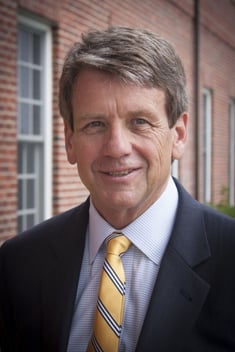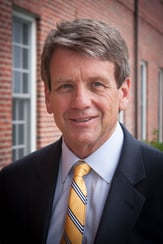
The presidential election is scary. The “fright factor” of 2016 (theme: The Other Candidate is Far Worse) does not arise merely from the two seriously flawed candidates that have somehow risen to the top. People are legitimately afraid that, no matter who becomes president, our nation’s future is in genuine jeopardy.
Why should a president have the capacity to destroy our nation? What kind of power goes with that office that would put freedom itself in jeopardy?
Recently, I was teaching on the subject of “Presidential Powers” in my Patrick Henry College course on Constitutional Law. Students are assigned to read Federalist No. 69 written by Alexander Hamilton (now apparently a famous Broadway actor—or something like that). In this essay, Hamilton defends the Constitution against the charge that it creates a President with the powers of a king. In point after point, Hamilton gave the public assurances concerning the important constitutional limitations on the power of the presidency.
However, if one reviews the differences between the role of the British king in 1789 and that of the president as it functions today, we find that the differences have been essentially obliterated.
Let’s explore those intended differences:
-
The King was a permanent and hereditary position. The President only served for a renewable four-year term. Despite the tendencies of having repeat presidents from the same family, this is one difference that is still essentially intact.
-
The King was above the law and could not be brought to justice for criminal or unjust behavior. The President can be impeached and tried for criminal behavior. The reality is that this difference is largely ignored and it extends to other powerful people. The reason that Hillary Clinton is not on trialtoday for her violations of our national security is that she is simply too powerful to mess with. The Founders projected a Congress with spines, but we don’t see much of that now.
-
The King possessed an absolute veto. The president’s veto can be overridden by super-majority votes in both houses of Congress. However, the King could never make laws. Nothing in the Constitution suggests that the President has the power to make laws—indeed, it says to the contrary: that all law-making power is vested in Congress. Today, if the President can’t get the laws he wants from Congress, using his phone and pen, he makes the laws he desires. Obama’s executive edicts that tell the states that if they don’t implement his desired policies on transgendered bathrooms and locker-rooms, they will lose all federal education funding is 100 percent a presidential law. The King of England had no such power in 1789. In this sphere, the presidency has become more than a constitutional monarch like England; he is much more like a potentate with absolute power.
-
While both the King and the President have the power of commander-in-chief, Hamilton noted the important difference about starting wars. The King made the unilateral decision to commit the nation to war, whereas under the Constitution, only Congress could declare war. In practice, Congress has not declared war since World War II. Every war since then has been commenced on the sole decision of the President—a very king-like history.
-
In the area of foreign relations, there was a very important difference between the power of the President and that of the King: the King alone made treaties. Under the Constitution, the President negotiated treaties, but the United States did not become bound to any treaty until it was ratified by two-thirds of the U.S. Senate. However, President Obama recently announced that he alone had ratified an important multilateral climate treaty, made in a joint announcement with China. Kings have such powers; the President is not supposed to have this authority. There are over 9,000 documents that are considered treaties under international law that the United States has approved by the sole decision of the President. This is not an Obama problem, this is a problem of presidential power.
-
The King could create offices and fill them at his pleasure. The President could only appoint people to offices created by Congress and the most senior appointments required approval by the U.S. Senate. However, Presidents have taken to appointing “czars”—administrative offices that are not found in the U.S. Code—and fills them at his pleasure. It is, in fact, a very czar-like practice.
-
Kings could make “denizens of aliens.” Presidents could not do so. A “denizen” is a lawful, permanent resident of a country, state, or city. Presidents were not supposed to have the king-like power to change the status of aliens coming to this country. We all know that this area of presidential history has been replete with king-like edicts impacting millions of aliens.
Hamilton concluded that it was totally erroneous to claim that “unlike things resemble each other.” The powers of the King were different from the powers of the Presidency under the Constitution. He said that it was equally spurious to claim that “elective and periodical servants of the people” would become “an aristocracy, a monarchy, and a despotism.”
The office that the Founders created should not cause us anxiety. On the other hand, such a limited office might not attract those who hunger for power, prestige, and self-glory. The solution is not found in elections alone. We must reduce the power of the presidency back to its original contours. Only the Convention of States can do that.
If we want to stop being afraid of presidential elections, then we must stop giving that office all of the trappings of a monarchy.
 Michael Farris is the former President & CEO of Alliance Defending Freedom. He served in this capacity from 2017 until 2022.
Michael Farris is the former President & CEO of Alliance Defending Freedom. He served in this capacity from 2017 until 2022.
Before joining ADF, Farris was founding president of both the Home School Legal Defense Association (1983) and Patrick Henry College (2000) and continues to serve as chairman of the board of HSLDA and PHC and is chancellor emeritus of PHC.
This post is shared with permission.



